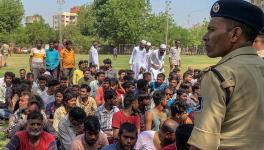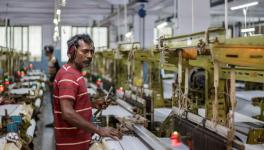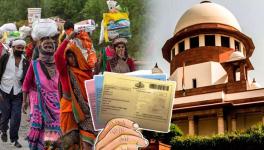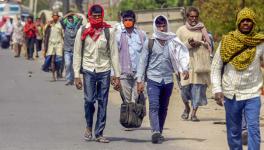How are the Migrant Workers of India Doing?
The Madhya Pradesh High Court on Friday, December 5, directed the state government to draw a definite plan to rehabilitate the migrant workers, who returned to the state after losing their livelihoods during the ongoing pandemic. The court also expressed dissatisfaction over the information provided by the state government about the steps it has taken for these labourers.
A division bench comprising Acting Chief Justice Sanjay Yadav and Justice V K Shukla gave the direction which stated, “We are not satisfied by the chart produced by the state and its functionaries. Instead, they are required to draw out a definite plan to rehabilitate these migrated labourers so that they can earn livelihood in their home state.”
Social organisation Bandhua Mukti Morcha had filed a petition seeking direction to the state government to grant relief to the labourers, who returned to MP from other states during the pandemic. The government’s reply to the petition stated that there are about 7,40,440 migrant labourers registered during the pandemic and employment was given to 44,634 of them, that is, only 6% of the workers received employment.
The situation is not very different in other states across the country either. In a report released in November 2020, the Migrant Workers Solidarity Network (MWSN), a collective of workers’ groups and non-governmental organisations, explored these questions through the lived experiences of migrant workers. The report contends that the avoidable misery the workers endured during the lockdown was not an anomaly, but an effect of their implicit exclusion from full citizenship.
The report said, “On March 13, the Government of India officially declared that it was not a public health emergency. Then, the State dramatically announced a sudden nationwide Lockdown giving just four hours’ notice to millions of Indians on March 24.” And what followed was the ‘largest human exodus in contemporary history’, adding unprecedented struggles to the already existing plight of the workers.
The lockdown period also witnessed several controversial policies being pushed through by the Union government without much public or Parliamentary discussion. Crucial legislation involving major changes in labour laws, agriculture, have been passed within the few months of the pandemic-induced lockdown. Major regressive measures which substantively change the education system as well as the environmental regulation regimes have been pushed through during the pandemic. The report added, “What these policies share in addition to being anti-people is that their passage in Parliament saw little debate or discussion. major concessions, with either more scope for easier allocation of land or forest for private profit-making or entry into publicly-funded sectors such as education, kisan mandis, mining, railways and so on.”
Also read: COVID-19 Lockdown: Why Compensation to Workers is Overdue in India
The UnorganiSed Workers Social Security Act, 2008, provided for provident fund, medical and maternity benefits, formation of welfare boards and registration of unorganised workers. The Centre and state governments are to be principally responsible for ensuring the same. MWSN points out that none of the stated objectives of the Act have been fulfilled.
No Social Security
The lockdown also brought to the spotlight the basic need for ensuring worker’s social protections through a comprehensive legal framework for portability of social security such as the Public Distribution System (PDS), which is a part of the National Food Security Act (NFSA). This demand has been raised again and again by various social organisations and workers’ unions for decades. The report said, “The government had rationalised the almost forced universal coverage of Aadhaar saying it would help in portability of PDS. In 2018, the Integrated Management of Public Distribution System (entailing the One Nation, One Ration Card scheme) was announced and linked to Aadhaar enrolment to facilitate access to PDS by lower income citizens of the country.”
According to the Stranded Workers Action Group (SWAN), around 81.6% of migrant workers did not receive rations during the lockdown. In a report titled Manufactured Maladies: Lives and Livelihoods of Migrant Workers During COVID‑19 Lockdown in India published in The Indian Journal of Labour Economics in October, volunteers of the network gave account of the hardships faced by the workers. Roughly 67% of India’s population is entitled to subsidised food grains through NFSA. According to recent estimates by experts, 100 million people are excluded from their PDS entitlement because the Government of India continues to use the 2011 census population figures to calculate the coverage under NFSA.
In a primary report on the Rehabilitation of Migrant Workers in India, the Federation of Indian Chambers of Commerce & Industry (FICCI) pointed out the need for better social security for workers. It said, “There is an urgent need for a robust Social Security Scheme for all the workers including daily wage labourers. Basic necessities such as health care and insurance, old-age security, unemployment insurance, the minimum wage could be part of the scheme. It is suggested that all related existing acts and laws are comprehensively reviewed.”
Also read: Death of a Tribal Labourer Highlights Need for Social Security for Migrant Workers
However, the Union government and most state governments have not paid any heed to the urgent recommendations made by several organisations and experts.
The Housing Distress
A large part of the distress caused during the lockdown was due to the inaccessibility of basic housing and the inability to pay rents. MWSN pointed out that the housing crisis was not generated by the lockdown. “On average, an Indian worker, in most destination cities of work, lives in rented rooms without the minimum of sanitation provisions, rent subsidies and so on. As a matter of fact, in many sectors, it is common practice that workers are cooped up in single rooms which often double up as workshops as well,” it said.
The paper written by SWAN volunteers also put forward testimonials. Azad Prasad was part of a group of seven members from Bihar who had been residents of Delhi for several years. Azad worked in a small shop and earned Rs 400 per day, but had not been paid during lockdown. He, however, had to pay house rent of Rs 4,500. They had run out of cooking gas, and his children had trouble eating at the government feeding centres, and they had to reach out to SWAN for help, with no money and just one day of rations left.
Many workers were forced to survive by borrowing from friends, relatives and shops. This pushed them into a cycle of indebtedness. For instance, when Arun Kumar, a migrant worker from Bihar employed in a textile factory in Ludhiana, Punjab, reached out to SWAN in June, he had already taken Rs 14,000 worth of rations on credit over three months from a local shopkeeper. In addition, he had to also pay his monthly house rent of Rs 10,000.
In May, 2020, the Union government issued a notice saying that landlords were not to collect rents from low paid or migrant workers, but it never issued any directions on how it would be implemented, and hence, it was never implemented.
The Apathy of the Government
As the MWSN report points out, no serious, effective steps have been taken towards improving the conditions of workers who managed to survive the journey home. The government made a plethora of promises, in terms of providing ration, housing and employment rights and under various schemes— Pradhan Mantri Garib Kalyan Anna Yojana, Garib Kalyan Rozgar Yojana, Pradhan Mantri Awas Yojana, Jan Dhan Yojana, and One Nation, One Ration Card—the ground reality is still the same, if not worse.
The report said, “Migrant workers in most destination cities have no democratic voice. They live at the mercy of whatever treatment is meted out by governments and employers.” It added, “While the country saw various legislations being enacted in the last six months itself, the government has initiated no deliberation in either house of Parliament on how to ensure democratic participation of low-paid migrant workers in deciding the course of their lives, their place of residence or type of work within the fragmented jurisdictions of destination states through participatory mechanisms.”
Also read: Most Indian States Fail to Integrate Migrant Workers, Says Index
Get the latest reports & analysis with people's perspective on Protests, movements & deep analytical videos, discussions of the current affairs in your Telegram app. Subscribe to NewsClick's Telegram channel & get Real-Time updates on stories, as they get published on our website.
























